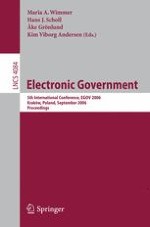2006 | Book
Electronic Government
5th International Conference, EGOV 2006, Kraków, Poland, September 4-8, 2006. Proceedings
Editors: Maria A. Wimmer, Hans J. Scholl, Åke Grönlund, Kim Viborg Andersen
Publisher: Springer Berlin Heidelberg
Book Series : Lecture Notes in Computer Science
